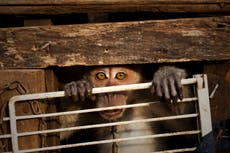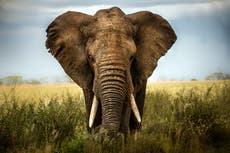Wildlife crime and trade laws are not fit for purpose in a post Covid-19 world
Stop the Illegal Wildlife Trade: We are protecting wildlife at risk from poachers due to the conservation funding crisis caused by Covid-19. Help is desperately needed to support wildlife rangers, local communities and law enforcement personnel to prevent wildlife crime

We are all experiencing this Covid-19 pandemic together, and it has reminded us, albeit in a devastating way, of the interconnected nature of things, most particularly between economies, the environment, and human and wildlife health and welfare.
This observation applies equally to wildlife trade – be it legal, illegal, regulated, or unregulated. This pandemic has reminded us of what the world’s best scientists have been telling us for some time now: wildlife issues are not just about conservation, they are also about public and animal health, and if we get it wrong, it can have massive global implications.
We know how viruses can spillover from certain wild animals to people through wildlife trade, markets and consumption. It is an issue that is now very high in our collective consciousness.
And we have already seen some countries moving ahead to take stricter measures to address these risks, which is great, but to be effective we need a global response. These wildlife-related health risks must be addressed through international cooperation and international laws. So, are our current international laws fit for purpose in a post Covid-19 world?
Short answer, no.
Our current international regime for regulating wildlife trade and combating wildlife crime, including illegal wildlife trade, is inadequate both for regulating the trade, markets and consumption that pose a risk to public health, as well as for ending wildlife crime. They do not reflect the interconnected nature of things. Rather, they reflect the siloed approach of the 1970s.
Looking first at legal, regulated trade. Cites (the Convention on International Trade in Endangered Species of Wild Fauna and Flora) is the global wildlife trade regulator. It was negotiated and signed in the early 1970s, and it was designed to address over exploitation of wildlife through international trade. It developed a robust international regime to ensure that trade in a listed species did not threaten its survival. It is not perfect, but it does this quite well.
But Cites was never designed to address the public and animal health aspects of wildlife trade. Its narrow focus on overexploitation was sound when the convention was signed in 1973, but it cannot be sustained in a post Covid-19 world. Today we need to take a “one health” approach to wildlife trade.
We can do this by adopting amendments to Cites that build public and animal health criteria into its decision-making processes, thereby making it a contemporary and relevant convention for a post Covid-19 world.
Now, turning to illegal wildlife trade. Trade in Cites listed species is valued at about $20bn (£15.4bn) annually, but if we add all species in illegal trade it balloons out to about $200bn. These crimes also deprive governments of revenue, degrade ecosystems and their ability to sequester carbon and exacerbate corruption, insecurity, and poverty, which The Independent’s Stop the Illegal Wildlife Trade campaign is bringing to the public’s attention.
Further, as more restrictions are placed on wildlife trade, markets and consumption that could pose a risk to public health, we will need to scale up our enforcement efforts to ensure such trade does not simply move underground.
However, notwithstanding these massive and highly destructive crimes, there is no global agreement on wildlife crime, as there is for example on human trafficking.
Cites has been heavily relied upon but it was not designed to deal with wildlife crime, it is a trade-related convention not a crime-related convention. However, in the absence of any other instrument, and facing a surge in trafficking, we made the best possible use we could of it.
But we have stretched Cites’s mandate to the limit – we need more if we are to win this fight. We need look to all species in illegal trade and to embed combatting wildlife crime where it belongs, namely into the international criminal law framework.
We can do this by developing a fourth protocol on wildlife crime under the UN Convention Against Transnational Organised Crime (UNCTOC). Looked at overall, left as it is our system is not going to prevent the next pandemic. It could, in fact, be raising our potential exposure to zoonotic diseases.
Cites was groundbreaking in its day and our predecessors showed great ambition and courage to negotiate such an agreement in the 1970s.
But it is now 2020. We live in a post Covid-19 world. We simply cannot allow a wildlife trade regime to prevail that fails to include public and animal health into its decision making, nor can we stand by and watch wildlife crimes continue to escalate without scaling up our international response.
The youth of this world is taking a massive hit from this pandemic. We owe it to them to pass on a legal framework that is fit for purpose and that gives us the best chance of avoiding future wildlife related pandemics and all the misery that comes with it. In doing so, we will need to show the same level of ambition and courage as our predecessors did back in the 1970s.
John E Scanlon is the former head of Cites and is now chair of the Global Initiative to End Wildlife Crime and of the UK IWT Challenge Fund


Join our commenting forum
Join thought-provoking conversations, follow other Independent readers and see their replies
Comments